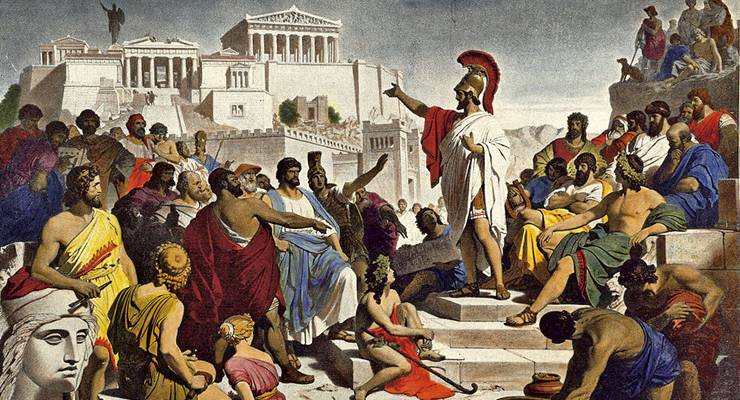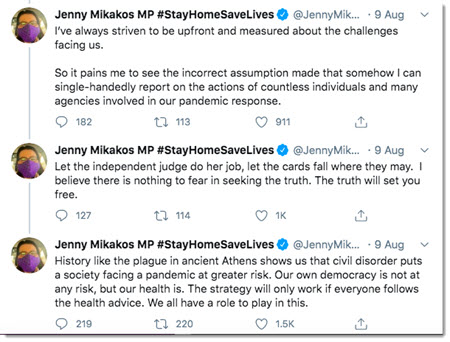
On Saturday, Victorian Health Minister Jenny Mikakos took some time away from the ghastly grind of death numbers and infection curves to tweet about ancient Greece.
Buried in a thread that touched on Pericles (whose bust adorns her office), and the plague of Athens, was a plea for people to leave her alone about the state government’s failures, and let the hotel quarantine inquiry run its course.

“History like the plague in ancient Athens shows us that civil disorder puts a society facing a pandemic at greater risk,” Mikakos wrote.
Mikakos wasn’t the only one looking backwards.
In his Australian Financial Review column (featuring a frankly unnecessary large picture of Hitler), former foreign minister-turned-Twitter punchline Alexander Downer became the millionth person to compare our current era to the 1930s.
And former NSW premier Mike Baird closed out his gushing, bipartisan ode to Victorian Premier Daniel Andrews by quoting Teddy Roosevelt.
The same quote, about “the man in the arena whose face is marred by dust and sweat and blood” was used by Nixon in his resignation speech — perhaps not the association Baird was going for, but nice words nonetheless.
What is it about our current moment that makes politicians and pundits look to the past for a dash of inspiration? For one thing, it’s about certainty.
What makes the virus maddening is the way the unknown has infected our everyday lives.
We spend mornings anxiously watching the infection curve. Millions are out of work, and millions more are nervously looking over their shoulder at the recession closing in.
We don’t know when the things that bring us joy and solace will return. A vaccine still feels very far away. We’ve forgotten what “normal” even means.
The past, messy and contested as it is, offers us the comfort of certainty. Thanks in part to a mass culture that reduces history to a palatable narrative, we always know how the story ends.
We know that while the Spanish Flu ravaged the world for two years, it sputtered out and was forgotten. With any luck, COVID-19 will do the same. Hand-wringing references to a return of the 1930s, an ongoing feature of the discourse since Trump was first elected, fill us not with fear, but hope: we know that at the end of that story, the good guys won, and all was well.
It’s no accident that in the early days of the pandemic, Britain, and to a lesser extent Australia leaned in to Blitz-era mythology. The Queen quoted wartime singer Vera Lynn, health workers were valourised like returning soldiers.
But such narratives offer little more than rhetorical flourish and distraction. Mikakos’ references to Ancient Greece were all window-dressing, an elaborate pseudo-apology for her stubborn refusal to answer questions about hotel quarantine. UK Prime Minister Boris Johnson, for all his posh pomposity, was never going to be a Churchill.
And while there is always room to learn from history, such references to past glories give us merely a fleeting sense of certainty, nothing more. They they won’t alter the course of the next six months. They won’t undo failures from at all levels of governments. They won’t put people into stable, secure work.
Stories alone won’t beat the virus.








I enjoyed Mike Baird’s gushing statement. It was an island of decency in a sea of blame, gaslighting and malevolence. From an ex-premier who knows that if you deliver services you will make mistakes. You can’t undo mistakes but you can learn from them.
Agree
I also agree…its a pity the Victorian opposition leader and his set of muppets don’t adopt a similar approach. Thank you Mike Baird for being a decent human being…and I don’t even live in Victoria!
“Those who do not learn from History are doomed to repeat it.”
Those who have not learned that maxim are bound to write the kind of meaningless drivel which you have produced in this little diatribe.
Perhaps you and Mr. Schwab need to study some human behavioural psychology before you presume to worthwhile opinion.
Fortunately the Federal Govt has increased spending on mental health by $1.5b. Now Rolly might finally get some help for his unhingement.
That is abusive and completely unacceptable. Are you Mr Schwab’s manager? Are you capable of accounting for other ideas? Cut it out!
Agree with rolly
I don’t understand the point of this article. Nothing “alone” will defeat the virus, and nobody actually thinks historical narratives can defeat the virus.
The claim you seem to be making is that knowledge of the past is essentially useless, because politicians, with varying motives, have referenced historical narratives for their own objectives. I just don’t agree. Your more pertinent point that allusions to past certainty by politicians is nothing but a rhetorical distraction says nothing about history. Rather, it should be a commentary about the ways in which history is misused, and based on popular mythologies about the past rather than a critical engagement with it. Perhaps if the public (and journalists) were more engaged with actual history, these popular myths would not be reified in the way that they are.
Of course history alone won’t defeat the virus, literally nobody thinks that. Journalism alone won’t defeat the virus either, should we do away with that too?
How about: Nothing about the future is certain, apart from the predictions of mathematics and physics. Why do we crave certainty and refuse to deal with the reality that uncertainty is what awaits us all? Because of one of capitalism’s most insidious tricks. The illusion of certainty is what we are sold by corporations and politics. But the irony is that the only justification for profit is the acceptance of uncertainty (ie risk) and the readiness to manage that uncertainty for reward. And to complete the unvirtuous circle, corporations demand of government, and get it through unjustified influence, certainty of profit at the expense of society.
History gives us some certainty of the past, but is aways corrupted to a degree by the narrative fallacy for which humans are suckers. History is written by the victors, not the suffers of historic consequence.
I think it was Margaret Atwood who wrote that history does not repeat, but it rhymes. Wise people look at the past to see patterns, to compare present circumstances with past events and act accordingly, That’s why we have quarantine, the single policy that has saved so many lives. It’s the most ancient of all remedies against an unknown infectious disease. That’s also why the citizens of countries affected by SARS were both swift to act and responsive to their governments’ restrictions. They recognized the rhyme.
Australia was especially lucky that we have so many Chinese citizens as it was they who pressured governments by refusing to send their children to school at the beginning of the year.
The value of past events is also why scientists and wise governments are doing their best to work collaboratively on both treatments and vaccines rather than follow the commercial instinct to be selfishly competitive.
Very well put Joanna.
It was Mark Twain who said it first.
Mark Twain said most things first